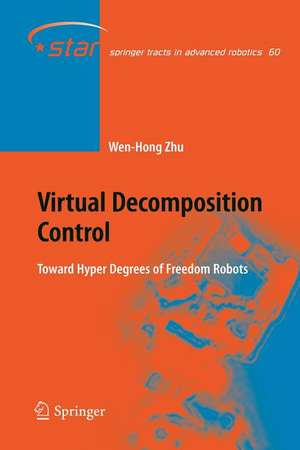Virtual Decomposition Control: Toward Hyper Degrees of Freedom Robots: Springer Tracts in Advanced Robotics, cartea 60
Autor Wen-Hong Zhuen Limba Engleză Paperback – 4 mai 2012
This book comprises fourteen chapters. The first five chapters form the foundation of this approach. The remaining nine chapters are relatively independent. Starting from Chapter 6, each chapter deals with a particular type of systems including motor/transmission assemblies, hydraulic robots, coordinated multiple robots, space robots, humanoid robots, adaptive teleoperation, and modular robot manipulators. At the end, the extensions of this approach to distributed-parameter systems and to electrical circuits are given, paving the way for other applications to follow.
This book is intended for practitioners, researchers, and graduate students who have acquired fundamental knowledge on robotics and control systems and have been committed to achieving the best control performances on complex robotics systems and beyond.
| Toate formatele și edițiile | Preț | Express |
|---|---|---|
| Paperback (1) | 952.89 lei 43-57 zile | |
| Springer Berlin, Heidelberg – 4 mai 2012 | 952.89 lei 43-57 zile | |
| Hardback (1) | 959.50 lei 43-57 zile | |
| Springer Berlin, Heidelberg – 29 mar 2010 | 959.50 lei 43-57 zile |
Din seria Springer Tracts in Advanced Robotics
- 18%
 Preț: 910.26 lei
Preț: 910.26 lei - 18%
 Preț: 893.71 lei
Preț: 893.71 lei -
 Preț: 445.98 lei
Preț: 445.98 lei -
 Preț: 406.44 lei
Preț: 406.44 lei - 13%
 Preț: 371.08 lei
Preț: 371.08 lei - 17%
 Preț: 378.36 lei
Preț: 378.36 lei - 15%
 Preț: 640.88 lei
Preț: 640.88 lei - 18%
 Preț: 783.98 lei
Preț: 783.98 lei - 15%
 Preț: 641.74 lei
Preț: 641.74 lei - 15%
 Preț: 640.88 lei
Preț: 640.88 lei - 18%
 Preț: 994.72 lei
Preț: 994.72 lei - 18%
 Preț: 778.45 lei
Preț: 778.45 lei - 18%
 Preț: 730.35 lei
Preț: 730.35 lei - 18%
 Preț: 1233.83 lei
Preț: 1233.83 lei - 18%
 Preț: 951.47 lei
Preț: 951.47 lei - 15%
 Preț: 640.06 lei
Preț: 640.06 lei - 18%
 Preț: 1844.67 lei
Preț: 1844.67 lei - 15%
 Preț: 642.51 lei
Preț: 642.51 lei - 18%
 Preț: 1112.30 lei
Preț: 1112.30 lei - 15%
 Preț: 665.08 lei
Preț: 665.08 lei - 18%
 Preț: 947.85 lei
Preț: 947.85 lei - 15%
 Preț: 640.88 lei
Preț: 640.88 lei - 18%
 Preț: 776.88 lei
Preț: 776.88 lei - 18%
 Preț: 959.04 lei
Preț: 959.04 lei - 15%
 Preț: 659.02 lei
Preț: 659.02 lei - 15%
 Preț: 654.95 lei
Preț: 654.95 lei - 18%
 Preț: 973.38 lei
Preț: 973.38 lei - 5%
 Preț: 724.70 lei
Preț: 724.70 lei - 18%
 Preț: 981.49 lei
Preț: 981.49 lei - 18%
 Preț: 954.45 lei
Preț: 954.45 lei - 15%
 Preț: 641.53 lei
Preț: 641.53 lei - 15%
 Preț: 653.98 lei
Preț: 653.98 lei - 24%
 Preț: 814.83 lei
Preț: 814.83 lei - 18%
 Preț: 968.65 lei
Preț: 968.65 lei - 18%
 Preț: 970.70 lei
Preț: 970.70 lei
Preț: 952.89 lei
Preț vechi: 1162.06 lei
-18% Nou
Puncte Express: 1429
Preț estimativ în valută:
182.39€ • 198.19$ • 153.31£
182.39€ • 198.19$ • 153.31£
Carte tipărită la comandă
Livrare economică 21 aprilie-05 mai
Preluare comenzi: 021 569.72.76
Specificații
ISBN-13: 9783642262982
ISBN-10: 3642262988
Pagini: 480
Ilustrații: XXV, 448 p. 43 illus.
Greutate: 0.66 kg
Ediția:2010
Editura: Springer Berlin, Heidelberg
Colecția Springer
Seria Springer Tracts in Advanced Robotics
Locul publicării:Berlin, Heidelberg, Germany
ISBN-10: 3642262988
Pagini: 480
Ilustrații: XXV, 448 p. 43 illus.
Greutate: 0.66 kg
Ediția:2010
Editura: Springer Berlin, Heidelberg
Colecția Springer
Seria Springer Tracts in Advanced Robotics
Locul publicării:Berlin, Heidelberg, Germany
Public țintă
ResearchCuprins
Virtual Decomposition Control Theory.- Mathematical Preliminaries.- Virtual Decomposition Control - A Two DOF Example.- Virtual Decomposition Control - General Formulation.- Virtual Decomposition Control Applications.- Control of Electrically Driven Robots.- Control of Motor/Transmission Assemblies.- Control of Hydraulic Robots.- Control of Coordinated Multiple Robot Manipulators.- Control of Space Robots.- Control of Humanoid Robots.- Control of Force-Reflected Bilateral Teleoperation.- Control of Modular Robot Manipulators.- Control of Flexible Link Robots.- Applications to Electrical Circuits.
Recenzii
From the reviews:
“This book discusses for the first time about subsystem-based control of robots without compromising control performances, the proposed VDC approach using subsystems dynamics to conduct control computation while rigorously guaranteeing the stability of the entire robot without imposing additional approximations. … a very interesting monograph introducing the new theory of Virtual Decomposition Control (VDC), and applying it fruitfully to the control of various types of robots.” (Silvia Curteanu, Zentralblatt MATH, Vol. 1239, 2012)
“This book discusses for the first time about subsystem-based control of robots without compromising control performances, the proposed VDC approach using subsystems dynamics to conduct control computation while rigorously guaranteeing the stability of the entire robot without imposing additional approximations. … a very interesting monograph introducing the new theory of Virtual Decomposition Control (VDC), and applying it fruitfully to the control of various types of robots.” (Silvia Curteanu, Zentralblatt MATH, Vol. 1239, 2012)
Textul de pe ultima copertă
Driven by the need to achieve superior control performances for robots with hyper degrees of freedom, the virtual decomposition control approach is thoroughly presented in this book. This approach uses subsystem (such as links and joints of a complex robot) dynamics to conduct control design, while guaranteeing the stability and convergence of the entire complex robot without compromising the rigorousness of the system analysis.
The central concept of this approach is the definition of the virtual stability. The stability of the entire complex robot is mathematically equivalent to the virtual stability of every subsystem. This fact allows us to convert a large problem to a few simple problems with mathematical certainty.
This book comprises fourteen chapters. The first five chapters form the foundation of this approach. The remaining nine chapters are relatively independent. Starting from Chapter 6, each chapter deals with a particular type of systemsincluding motor/transmission assemblies, hydraulic robots, coordinated multiple robots, space robots, humanoid robots, adaptive teleoperation, and modular robot manipulators. At the end, the extensions of this approach to distributed-parameter systems and to electrical circuits are given, paving the way for other applications to follow.
This book is intended for practitioners, researchers, and graduate students who have acquired fundamental knowledge on robotics and control systems and have been committed to achieving the best control performances on complex robotics systems and beyond.
The central concept of this approach is the definition of the virtual stability. The stability of the entire complex robot is mathematically equivalent to the virtual stability of every subsystem. This fact allows us to convert a large problem to a few simple problems with mathematical certainty.
This book comprises fourteen chapters. The first five chapters form the foundation of this approach. The remaining nine chapters are relatively independent. Starting from Chapter 6, each chapter deals with a particular type of systemsincluding motor/transmission assemblies, hydraulic robots, coordinated multiple robots, space robots, humanoid robots, adaptive teleoperation, and modular robot manipulators. At the end, the extensions of this approach to distributed-parameter systems and to electrical circuits are given, paving the way for other applications to follow.
This book is intended for practitioners, researchers, and graduate students who have acquired fundamental knowledge on robotics and control systems and have been committed to achieving the best control performances on complex robotics systems and beyond.
Caracteristici
The most up-to-date on virtual decomposition control











